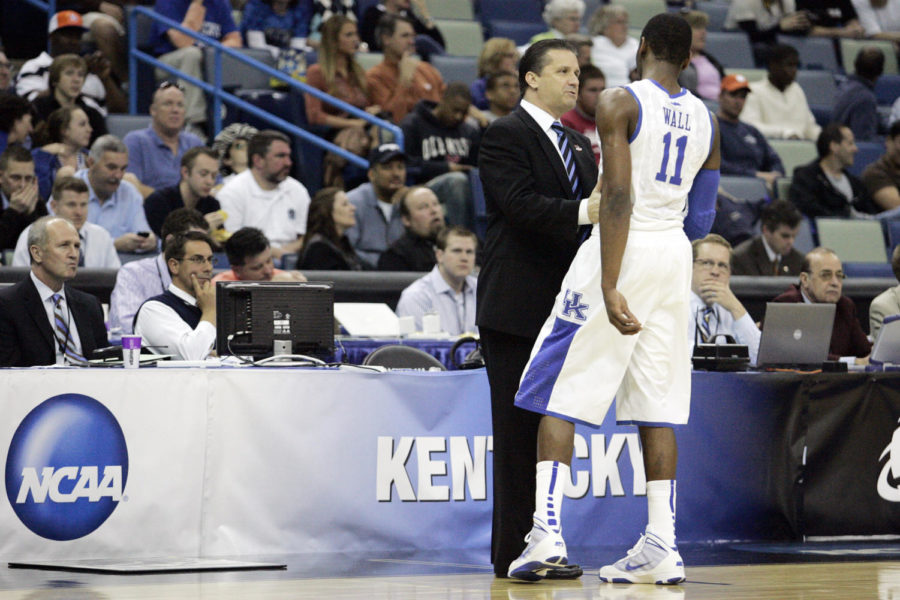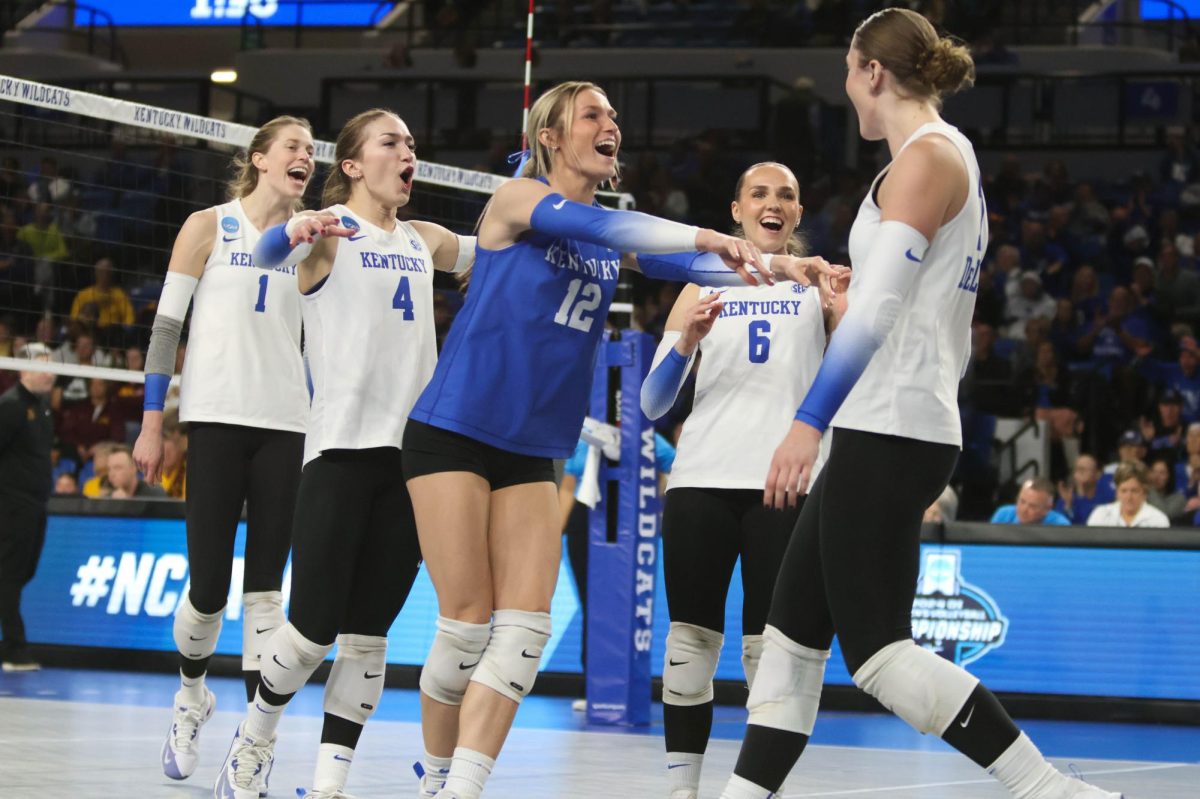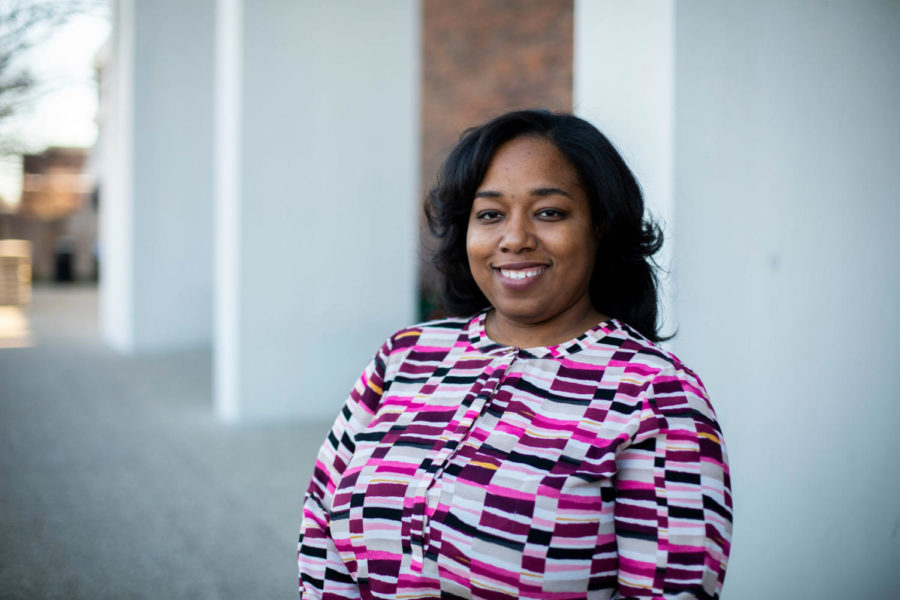UK’s first basic needs coordinator means business. How will she help students in need?
January 29, 2020
Arion Jett-Seals doesn’t make a habit of throwing in the towel. As the University of Kentucky’s first Basic Needs Coordinator, she brings resourcefulness, passion and an unwillingness to give up on her students to the table.
Jett-Seals received her Bachelor’s Degree in Social Work at UK before earning her Master’s in the same discipline at the University of Louisville. Throughout her 10 years of experience in various areas of human services work, Jett-Seals has served many different student populations by helping them navigate their resources and handle their emergency situations.
However, she holds one community college student’s story particularly close to her heart.
This particular student got into trouble with the law for a nonviolent offense that Jett-Seals says she has seen many students make throughout her career.
“I actually saw it on the news before the student came into my office,” she said. “The student came into my office and said, ‘I don’t know what I’m going to do. I need help.’ And I said, ‘I’ve been brainstorming.’”
Jett-Seals then wrote letters to the judge, attorney and prosecutor on the student’s case in an effort to convince them to reconsider having the student serve jail time. She detailed the student’s accomplishments and wrote about the possible effects of jail time on their life after release—extra fees and fines they wouldn’t be able to afford and the potential loss of their job and home.
“There’s just a downward cycle,” Jett-Seals said. “Not that they don’t know this, but I was willing to say it and I was willing to ask.”
Jett-Seals suggested making mandatory class attendance the student’s sentence instead. She included the student’s schedule in the letter, assuring the judge, attorney and prosecutor that the first day the student was missing or late to class, she would personally contact them.
“I got a reply that was just like, ‘You mean business, don’t you?’” Jett-Seals said. “Yes, I do.”
A few days later, Jett-Seals’ student told her that her suggestion was approved and they would see her in class the following day. The student finished the semester with straight A’s.
“Sometimes, I think things come up in your life and people say, ‘Oh, so much for that one’ or ‘So much for this situation’ and just kinda throw in the towel, but I didn’t see that as an end,” Jett-Seals said.
This can-do attitude is part of what has elevated Jett-Seals to her current position.
The University of Kentucky created the full-time Basic Needs Coordinator position in order to fulfill one of three demands made by a subset of SSTOP Hunger last spring.
Last March, six students from SSTOP Hunger, a committee dedicated to fighting the war on hunger in Kentucky, went on a hunger strike. Several others altered their diet in some other way as participation. Their protest was a part of their Basic Needs Campaign, which they said the administration had not taken seriously enough up to that point, according to a Kernel article.
The students’ three demands were for UK to establish and fund a physical Basic Needs Center, establish a Basic Needs Fund and create a full-time Basic Needs staff position.
Their hunger strike caught President Eli Capilouto’s attention. He met with the strikers before sending out an email publicizing resources on campus as well as announcing that the Big Blue Pantry would increase their hours of operation.
However, the subset of SSTOP Hunger students were not satisfied. Along with the Black Student Advisory Council, they peacefully occupied the Main Building on April 1 to continue making their demands.
The hiring of Jett-Seals as UK’s first Basic Needs Coordinator this fall satisfied the first of the students’ demands. She said that there have been several ongoing conversations concerning the other demands.
For example, One Day for UK began last year on April 17 as a 24-hour fundraising event whose proceeds go to various program funds on campus. In its inaugural year, the Basic Needs and Persistence Fund received $10,325 in donations as part of the day of giving.
The Basic Needs Center, however, has been put on the backburner for now due to a lack of space on campus that is easily accessible to students, Jett-Seals said.
In the meantime, Jett-Seals’ first year has mostly consisted of assessing UK’s current resources and campus and community partners to determine where gaps in service exist. She also works directly with students, assessing their needs and either providing them resources or pointing them in the right direction to get them.
Some of the partners that Jett-Seals has already began collaborating with include Campus Kitchen, Big Blue Pantry, Financial Wellness, God’s Pantry and Swipe Ahead.
Jett-Seals took more administrative control over the Swipe Ahead program in her first semester as Basic Needs Coordinator, assessing the efficiency of the program. She found that most of the donated meal swipes were not utilized, and by revamping the application process, she has doubled the number of students who regularly utilize the meal swipes.
Campus Kitchens is another key campus partner that promotes sustainability and food security. Kendra Oo, its program director, says that they have been fighting against food insecurity on campus long before last spring’s hunger strike and Main Building occupation. However, student and faculty awareness of Campus Kitchens is still low.
Oo says that while the hunger strike didn’t involve all members of SSTOP Hunger or Campus Kitchens and seemed to overshadow pre-existing programs within the Department of Dietetics, it did lead to positive change—namely, the establishment of One Café and the hiring of Jett-Seals as Basic Needs Coordinator.
“[Jett-Seals] has been a wonderful resource to work with and we have been in communication in terms of what we can collaborate on more,” Oo said.
Oo also contributed to the 2017 Food Access and Housing Survey that found that 43 percent of UK students were food insecure and inspired some of SSTOP Hunger’s work. The administration said that there were design errors in the survey, however, that deemed its results unreliable. Oo corroborated this statement, saying that the data was only from a pilot sample of students. Her thesis paper, however, delved deeper into the issue of college food insecurity beyond that first survey.
Oo says she has been sharing her thesis findings with Jett-Seals, discussing which grants Jett-Seals is applying for and which programs she wants to run, and exchanging ideas and expertise. She hopes that together, they can increase awareness of programs like Campus Kitchen and Farm to Fork that offer resources to students in need of free meals.
Oo says that while free meals are important, they are only short-term solutions for a long-term problem.
“I always tell my students that it’s a part of food system issues,” Oo said. “Sometimes we tend to think, oh, it’s my fault that I cannot bring food to the table. But if you were to think of it in a broader, food system perspective, there are a lot of gaps. And that has been going on for decades and centuries, but now people are more aware.”
Jett-Seals’ job is to fill in those gaps as tightly as possible. She feels drawn to the work for several reasons.
“I think I’m just naturally a helper,” Jett-Seals said. “But also, a lot of experiences I had coming up in the public school system and higher ed made me want to advocate for students, make sure they were aware of services and programs that were out there because I know what it’s like to be one of those students.”
When Jett-Seals was in middle school, her father’s truck engine blew. As a truck driver of his own business and breadwinner of the family, the incident was catastrophic. The Jett-Seals family didn’t have access to enough funds to hold them over until the truck could be repaired. They lost their home, Jett-Seals said.
In high school, despite Jett-Seals’ father taking on a new trucking job, the family was still struggling. Gas prices were skyrocketing and the income that he brought in wasn’t covering it.
“Financial aid doesn’t really calculate that,” Jett-Seals said. “It just looks like I have a household that brings in all this money. That wasn’t so.”
One day Jett-Seals visited her school’s Family Resource Youth Service Coordinator (FRYSC). She didn’t exactly know what students went there for, but after “letting it all out”, she found that the office was a “safe haven for students.”
Jett-Seals had always known she wanted to go into a helping field, but this was it—her dream job. As a FRYSC, she could help future students who had experienced similar gaps in service as her.
Unfortunately for Jett-Seals, FRYSC positions didn’t open very often, so in the meantime she settled for positions as a non-profit worker, a BCTC counselor, a UK HIV social worker and a teacher for online classes at BCTC. Finally, a FRYSC job opening for Fayette County schools was posted, and Jett-Seals applied.
After several years working in her dream job, Jett-Seals asked for guidance from new former BCTC supervisor. She was finally on track with her life plan, but something was missing. Jett-Seals still felt the pull of the higher education work she had done before becoming a FRYSC.
“Sometimes you veer off that plan,” Jett-Seals said.
After talking to her former supervisor, Jett-Seals decided to begin looking for higher-education jobs. When she saw the Basic Needs Coordinator position at UK open, she says she was very excited. She immediately applied.
“That same day one of my teacher friends came running in right before the bell rang,” Jett-Seals said. “She had a printed-off copy of the job description like, ‘This is you, Arion.’ And I was like, ‘Uh, I already applied this morning.’”
Jett-Seals is excited to hit the ground running even harder in her second year as Basic Needs Coordinator.
One of her big plans has already been set into motion— the new Basic Needs website. It is still in its beginning stages, but Jett-Seals sees a lot of potential in virtual service for students who can’t find the time to visit Jett-Seals in person.
“We open and close just like everybody else,” she said. “So if that student’s on a different schedule, I would love to be able to work towards building and expanding the website for students to navigate resources, links to partners’ applications for assistance and things like that.”
Jett-Seals’ other main focus coming into the next school year will be to create an advisory council concerned with basic needs issues on campus.
“I think in the field that I’ve worked in, Human Services and Social Work, there are a lot of people that are having conversations and creating policies about people in need but no one who is having the conversation is actually a person in need or even done some of the work,” Jett-Seals said. “So I think it’s really important establishing this advisory council to have the opportunity to have conversations.”
Jett-Seals said there are several other projects in the works to be announced in the future. Her main goal is simply to make her office as much of a thorough resource as possible.
“I had to figure it out on my own,” Jett-Seal said. “But if you could just go to an office and say, ‘These are all the questions that I have and I am confused. I don’t know where to start,’ that just makes life a whole lot easier because I know what it’s like to be sent here, there and everywhere.”
Jett-Seals doesn’t always have the solutions. But she is determined to find another way for her students using the resources she has. She knows how it feels to be given up on, and she doesn’t want that for any of her students.
Jett-Seals developed an eye condition that took some of the vision in one of her eyes while at UK. However, one day while at graduate school, she woke up with blind spots in her good eye. After talking to one of her professors, they expressed their condolences but suggested that maybe it just the right time for Jett Seals’ to complete her graduate degree.
“I thought, are you kidding me? I’m in my last semester of grad school, it’s midterms, what do you mean it’s not the right time?” Jett-Seals said. “I remember what to that person seemed like ‘Oh gosh, there’s nothing we can do here’ but for me, I just don’t see things that way. I’m still looking for the next route. How can I take another avenue to get me to where I want to go?”
Jett-Seals said that this way of thinking has not only been beneficial to her but also to the students she has served. When others might quit, she is just getting started.
“I don’t mind trying,” Jett-Seals said. “I don’t mind asking, and if you tell me no, I’ll just find a better way to ask the question.”































































































































































